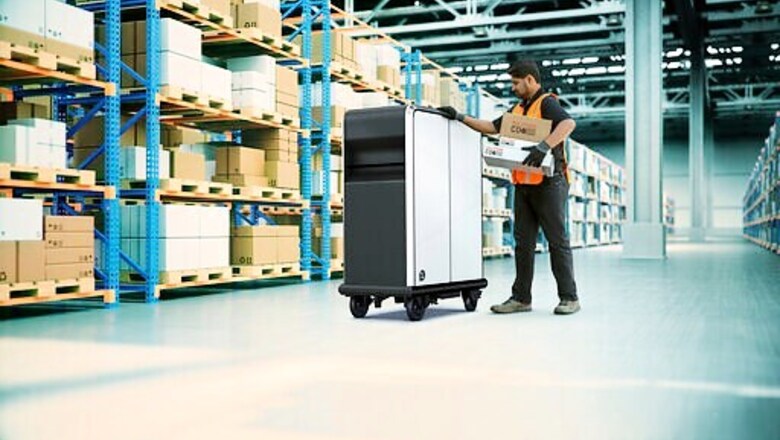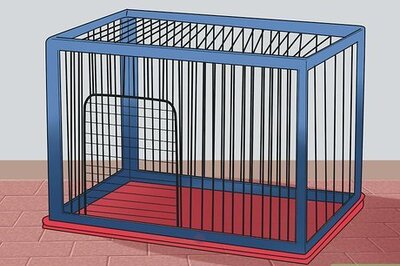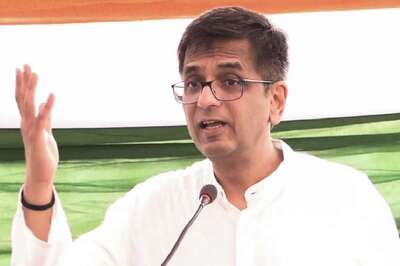
views
DETROIT: Casting his climate policy as a jobs plan, President Joe Biden left out important context and used fuzzy math when he announced sweeping new green initiatives that he says will boost the U.S. economy with the creation of 1 million new auto jobs.
That’s actually far from certain, if not unlikely.
A look at Biden’s statements at his signing of executive orders Wednesday that will replace the U.S. governments fleet of roughly 650,000 vehicles with electric models and encourage a broader national shift to electric cars:
BIDEN: Today is Climate Day at the White House, which means that today is Jobs Day at the White House. … We see these workers building new buildings, installing 500,000 new electric vehicle charging stations across the country as we modernize our highway systems to adapt to the changes that have already taken place. … Were going to harness the purchasing power of the federal government to buy clean, zero-emission vehicles that are made and sourced by union workers right here in America. … This will mean 1 million new jobs in the American automobile industry. One million.
THE FACTS: There’s plenty of skepticism about this claim. At least some of those new auto-related jobs would come at the expense of current ones. Auto industry analysts don’t see how a net gain of 1 million jobs in that sector can come from Biden’s plan.
One million new jobs in the auto industry is a highly ambitious goal that would mean more than doubling the number of workers now employed in motor vehicle and parts manufacturing.
Many analysts and the United Auto Workers union, in fact, have warned that electric vehicle manufacturing probably will mean fewer net auto-making jobs.
If more Americans drive electric vehicles, then it stands that fewer will drive gas-powered ones. And because electric vehicles generally have 30% to 40% fewer parts and are simpler to build, fewer workers will be needed to assemble them. That will require a reshuffling of jobs, as workers who once made engines, transmissions and other components for gas-powered cars have to switch to electric motors and batteries.
Because they are simpler, youre probably going to have far fewer people working in vehicle manufacturing than you have today, said Sam Abuelsamid, principal analyst for Guidehouse Insights. He noted that its far easier to automate manufacturing of battery cells and packs, which could reduce job levels even more.
More than 100,000 workers are engaged in building gas-powered engines alone.
Abuelsamid added that creating a million new auto jobs will be difficult in future years because U.S. new vehicle sales are projected to be flat at around pre-pandemic levels for the next decade. If nothing changed, youre not going to have a whole lot more employment, he said.
The White House did not immediately respond to a request for comment when asked for a breakdown of the 1 million new auto jobs that shows an accounting for lost jobs.
Nor would a shift of jobs from one sector to another necessarily mean that workers losing their jobs could easily make the jump to green jobs in the new economy. Part of Biden’s campaign promise has been to promote economic equity, such as bringing fuller opportunity for people without college degrees. In the short run, though, those workers may be hurt the most by initial job layoffs.
Kristin Dziczek, a vice president at the Center for Automotive Research, an industry think tank, said Bidens goal isnt well defined and will be a heavy lift. For example, the administration hasnt said in what time frame the 1 million jobs would be added.
The move toward electric vehicles already is happening, even though fully electric vehicles accounted for less than 2% of U.S. new vehicle sales last year. On Thursday, General Motors announced a goal of making most of its vehicles electric by 2035, the same year California plans to ban sales of new gas-powered vehicles.
Currently, automakers pay workers who assemble batteries less than they pay those who manufacture vehicles. Also, much of the battery work is done by other companies that pay less than what members of the United Auto Workers union make at vehicle assembly plants.
Biden’s campaign has said the additional jobs also would include those building and installing the half-million new charging stations, and construction workers who would retool factories to build electric vehicles. Many electric vehicle components are now made in other countries, and part of Biden’s plan is to build a U.S. supply chain to create additional factory jobs, the campaign has said.
Anybody who tells you its all positive for jobs you cant say one way or the other at this point, Dziczek said.
___
Rugaber and Yen reported from Washington. AP Economics Writer Josh Boak contributed to this report.
___
EDITOR’S NOTE A look at the veracity of claims by political figures.
___
Find AP Fact Checks at http://apnews.com/APFactCheck
Follow @APFactCheck on Twitter: https://twitter.com/APFactCheck
Disclaimer: This post has been auto-published from an agency feed without any modifications to the text and has not been reviewed by an editor
Read all the Latest News, Breaking News and Coronavirus News here




















Comments
0 comment